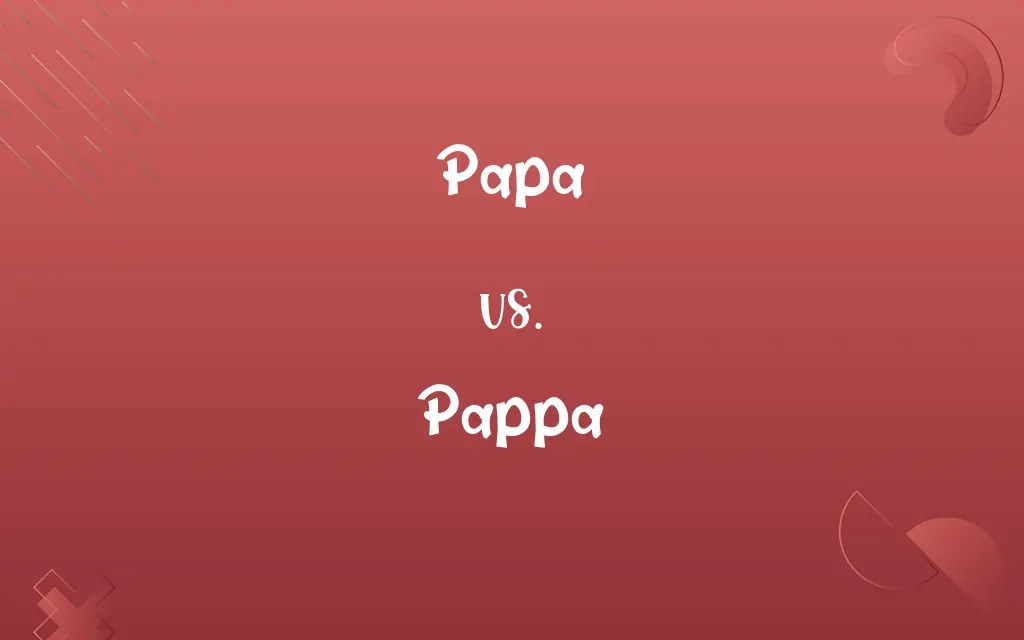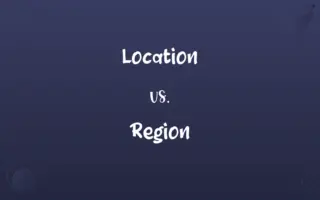Papa vs. Pappa: Know the Difference

By Shumaila Saeed & Hifza Nasir || Updated on March 4, 2024
"Papa" is a common term for father, used in many languages, while "pappa" is specifically the Swedish, Italian, and informal British term for dad or father.

Key Differences
"Papa" is widely recognized across various cultures as an affectionate term for father, embodying warmth and closeness between a child and their father. It's used in English as well as in many other languages, including French and Spanish, to denote a father figure. "Pappa," on the other hand, while similar in meaning, is used specifically in Swedish and Italian languages, and it's also found in informal British English, reflecting a similar level of affection and familiarity but within specific linguistic contexts.
Hifza Nasir
Mar 04, 2024
In terms of pronunciation and spelling, "papa" is the more universally accepted term, making it recognizable and easy to use in a global context. "Pappa," however, carries the same emotional weight but is tailored to fit the phonetic and spelling conventions of the Swedish and Italian languages, as well as a variant in British colloquial speech, thus it may not be as immediately recognizable outside of these cultures.
Shumaila Saeed
Mar 04, 2024
The usage of "papa" in literature and media has contributed to its widespread acceptance and understanding. It often appears in children's books, movies, and songs, further cementing its place as a term of endearment for a father. "Pappa," while equally significant within its specific cultural contexts, might not have the same international exposure, but it holds a place of affection within the languages and regions where it is used.
Shumaila Saeed
Mar 04, 2024
"Papa" serves as a bridge across languages, easily adapted and understood in many countries. This universal aspect makes it a term that can be used both formally and informally, transcending cultural boundaries. "Pappa," signifies a more localized expression of the father-child relationship, deeply rooted in the traditions and language of the Swedish, Italian, and certain English-speaking communities.
Hifza Nasir
Mar 04, 2024
Both "papa" and "pappa" highlight the intimate and loving relationship between a father and child, but their usage and recognition are shaped by linguistic and cultural nuances. "Papa" offers a broad, cross-cultural appeal, whereas "pappa" provides a glimpse into the specific familial dynamics of Swedish, Italian, and some British families, showcasing how language reflects familial bonds.
Shumaila Saeed
Mar 04, 2024
ADVERTISEMENT
Comparison Chart
Meaning
Affectionate term for father.
Specifically Swedish, Italian, and informal British term for dad.
Shumaila Saeed
Mar 04, 2024
Usage
Universal across many languages and cultures.
Used in Swedish, Italian, and certain English contexts.
Shumaila Saeed
Mar 04, 2024
Pronunciation
Uniform in most languages.
Adapted to fit Swedish, Italian, and British English phonetics.
Shumaila Saeed
Mar 04, 2024
Cultural Reach
Globally recognized and used.
More localized to specific cultures and languages.
Dua Fatima
Mar 04, 2024
In Literature & Media
Widespread representation.
Represented within specific cultural contexts.
Shumaila Saeed
Mar 04, 2024
ADVERTISEMENT
Papa and Pappa Definitions
Papa
Used in multiple languages with the same meaning.
Papa, can you read me a story? is understood in many cultures.
Shumaila Saeed
Mar 04, 2024
Pappa
Specific to cultural contexts.
The Italian storybook featured adventures of a boy and his pappa.
Shumaila Saeed
Mar 04, 2024
Papa
Denotes affection and closeness.
Papa always knew how to make her laugh.
Shumaila Saeed
Mar 04, 2024
Pappa
Swedish and Italian term for dad.
In Sweden, children call their father pappa.
Shumaila Saeed
Mar 04, 2024
Papa
Often used in children's literature.
The book's main character was a brave little girl and her papa.
Hifza Nasir
Mar 04, 2024
ADVERTISEMENT
Pappa
Conveys warmth and familiarity.
Pappa made the best spaghetti for dinner.
Hifza Nasir
Mar 04, 2024
Papa
Represents a father figure in media.
The movie depicted the strong bond between the protagonist and his papa.
Shumaila Saeed
Mar 04, 2024
Pappa
Used in informal British English.
She affectionately referred to her father as pappa in her letters.
Shumaila Saeed
Mar 04, 2024
Papa
A universal term for father.
She called out for her papa when she got scared.
Hifza Nasir
Mar 04, 2024
Pappa
Reflects linguistic nuances in familial terms.
Learning to say pappa was one of the child's first words.
Hifza Nasir
Mar 04, 2024
Papa
Dad, daddy, father; a familiar or old-fashioned term of address to one’s father.
Shumaila Saeed
Oct 19, 2023
Repeatedly Asked Queries
Why would someone use "pappa" over "papa"?
It could be due to cultural preferences, linguistic background, or personal affection for the term within their family.
Hifza Nasir
Mar 04, 2024
Do "papa" and "pappa" have different meanings?
They share the same fundamental meaning but differ in their linguistic and cultural usage.
Shumaila Saeed
Mar 04, 2024
Is "pappa" incorrect in English?
Not incorrect, but it's less common and more informal, often found in British English or when directly borrowing from Swedish or Italian.
Hifza Nasir
Mar 04, 2024
Can "pappa" be used in formal writing?
In English, it's more commonly used in informal contexts or creative writing that captures specific cultural nuances.
Shumaila Saeed
Mar 04, 2024
Are there variations of "papa" and "pappa" in other languages?
Yes, many languages have variations of these terms, each adapted to fit phonetic and cultural nuances.
Shumaila Saeed
Mar 04, 2024
Which term is more widely recognized globally?
"Papa" is more widely recognized and used across various cultures and languages.
Shumaila Saeed
Mar 04, 2024
Is it common to see "pappa" in English-speaking countries outside of the UK?
It's less common, with "papa" or other terms like "dad" being more prevalent.
Shumaila Saeed
Mar 04, 2024
Can "papa" and "pappa" be used interchangeably?
In English, "papa" is more universally understood, though "pappa" can be used affectionately or in specific cultural contexts.
Shumaila Saeed
Mar 04, 2024
Is "papa" formal or informal?
"Papa" is considered an affectionate, informal term for father.
Shumaila Saeed
Mar 04, 2024
How do these terms reflect cultural differences?
They showcase how familial relationships are linguistically expressed differently across cultures, reflecting varying traditions and norms.
Dua Fatima
Mar 04, 2024
What does the choice between "papa" and "pappa" say about a speaker?
It may indicate their cultural or linguistic background, personal preferences, or even familial traditions.
Dua Fatima
Mar 04, 2024
Is there a difference in affection conveyed by "papa" vs. "pappa"?
Both convey affection; the difference lies more in cultural and linguistic context than in the level of affection.
Hifza Nasir
Mar 04, 2024
Do "papa" and "pappa" have synonyms?
Yes, both have synonyms such as "dad," "daddy," "father," though these also vary widely in usage and connotation.
Hifza Nasir
Mar 04, 2024
How are "papa" and "pappa" used differently in literature?
"Papa" appears broadly in global literature, while "pappa" is more likely to appear in works specific to Swedish, Italian, or British contexts.
Shumaila Saeed
Mar 04, 2024
How does the use of "papa" vs. "pappa" affect language learning?
It highlights the importance of understanding cultural and linguistic nuances when learning languages, especially in terms of familial terms.
Shumaila Saeed
Mar 04, 2024
Share this page
Link for your blog / website
HTML
Link to share via messenger
About Author
Written by
Shumaila SaeedShumaila Saeed, an expert content creator with 6 years of experience, specializes in distilling complex topics into easily digestible comparisons, shining a light on the nuances that both inform and educate readers with clarity and accuracy.
Co-written by
Hifza Nasir








































































